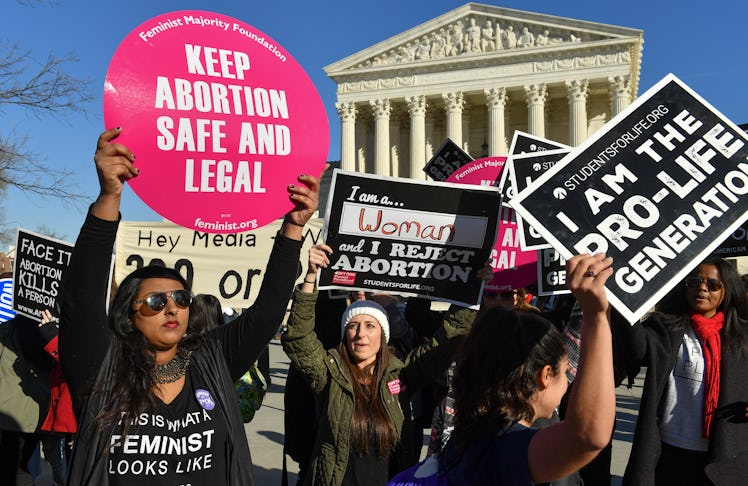
The Supreme Court Just Made A Major Ruling On Abortion
Despite everything else going on in the United States, it's still Supreme Court ruling season, and on June 29, 2020, the justices gave Americans a big one. The Supreme Court's ruling on abortion case June Medical Services, LLC v. Russo affirmed the right to access abortion care, yet again. The justices ruled in a 5-4 decision to strike down a Louisiana law that would have added regulations onto abortion providers and forced abortion providers to close their doors. The ruling is the second time in four years that the court has upheld the right to an abortion, and the first time since President Donald Trump appointed two right-leaning justices to the nation's highest court.
The case, previously called June Medical Services, LLC v. Gee, centered on a 2014 law passed in Louisiana, which required abortion providers to have admitting privileges — the ability to admit patients into a nearby hospital — at a hospital within 30 miles of their clinics in the event of procedural complications. If allowed to stand, the law would have left the entire state of Louisiana with one abortion provider. The law was remarkably similar to a Texas law that was struck down in the 2016 Supreme Court case Whole Woman's Health v. Hellerstedt.
Defenders of the law claimed that the regulations were necessary to protect abortion patients' health in the event of complications, while opponents argued that the law was more invested in closing clinics than protecting patient health. Additionally, opponents pointed to the fact that the rare abortion patient who did experience complications could be treated at a hospital whether or not the abortion provider had admitting privileges, in the same way as anyone experiencing a medical emergency.
The majority of Supreme Court justices sided with the latter argument. Justice Stephen Breyer wrote in the majority opinion that the law was "almost word-for-word identical to the Texas 'admitting privileges' law at issue in Whole Woman’s Health v. Hellerstedt." The ruling affirmed a lower court's decision that "Louisiana’s law poses a 'substantial obstacle' to women seeking an abortion ... the law offers no significant health-related benefits; and [the court's] determination that the law consequently imposes an 'undue burden' on a woman’s constitutional right to choose to have an abortion." Under existing law, abortion regulations cannot place an "undue burden" on patients seeking abortion care. Chief Justice John Roberts, in a concurring opinion, added that the court had essentially already decided the issue of admitting privileges in Whole Woman's Health v. Hellerstedt, and the Louisiana law was unconstitutional under current precedent.
Abortion rights advocates celebrated the decision. "Today’s decision is a win for women in Louisiana who will continue to have access to the time-sensitive abortion care they need. It’s a win for truth and fact-based decision making," Ilyse Hogue, the president of NARAL Pro-Choice America, said in a public statement. "Today’s decision shows that advocates can make a difference."
However, advocates also said that the fact that the law, which Roberts described in his opinion as "nearly identical" to the Texas law the court had previously struck down, had made it to the highest court was a warning that the fight for abortion rights would likely continue, as anti-abortion advocates and legislators would continue to pass additional regulations to see what sticks.
"We’re relieved that the Louisiana law has been blocked today but we’re concerned about tomorrow," Nancy Northrup, the president and CEO of the Center for Reproductive Rights, which argued the law at the Supreme Court, wrote in a statement shared with Elite Daily. "But the Court’s decision could embolden states to pass even more restrictive laws when clarity is needed if abortion rights are to be protected. ... Unfortunately, the Court’s ruling today will not stop those hell-bent on banning abortion. We will be back in court tomorrow and will continue to fight state by state, law by law to protect our constitutional right to abortion."
The ruling is the first major abortion case to come before the court since Trump nominated conservative justices Neil Gorsuch and Brett Kavanaugh to the bench, giving the court a tilt to the right and alarming some advocates of reproductive rights. As of June 29, the court is still releasing decisions on cases for 2020, with a decision on birth control expected in the days and weeks to follow.